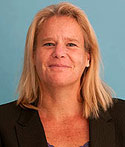Assessing U.S. Preparedness and Response in the Arctic: The Opportunities and Challenges of Increased Marine Activity
On March 27, U.S. Sen. Mark Begich, chairman of the Senate Subcommittee on Oceans, Atmosphere, Fisheries and Coast Guard, held a hearing in Alaska on lessons learned from the 2012 offshore drilling season as well as Arctic shipping safety.
Invited speakers included a Department of Interior (DOI) official, a Shell Oil Company executive, a representative of the U.S. Coast Guard, and Pew Arctic expert Eleanor Huffines.
Meet the Expert: Eleanor Huffines

Testimony of Eleanor Huffines U.S. Arctic Program, The Pew Charitable Trusts to the United States Senate Committee on Commerce, Science, and Transportation Subcommittee on Oceans, Atmosphere, Fisheries, and Coast Guard.
Chairman Begich, thank you for the invitation to participate in today's hearing. My name is Eleanor Huffines, and I am testifying in my capacity as the manager of the U.S. Arctic program for The Pew Charitable Trusts.
The Pew Charitable Trusts applies a rigorous, analytical approach to improve public policy, inform the public, and stimulate civic life. Pew's U.S. Arctic program promotes science and community-based conservation that reduces risks to the Arctic from climate change and industrial development, including oil and gas activities, commercial fishing, and industrial shipping. The program works closely with scientists, Alaska Natives, the U.S. government, local communities, and conservation groups to achieve key policy goals for protecting the health of the Arctic ecosystem.
You have invited me here today to discuss two broad topics: first, industry and federal preparedness for Arctic offshore oil and gas development, as well as what lessons can be drawn from Shell's 2012 drilling season; second, the challenges and opportunities that an increase in Arctic activity and development present for environmental and natural resources stewardship.
As an initial matter, Pew is grateful for your continued focus on and attention to the Arctic. Alaska's Arctic waters are unlike other areas of the ocean. Sea ice covers the northern Bering, Chukchi, and Beaufort seas for much of the year. The region is subject to severe weather, but it is also remarkably productive. Fish and wildlife—including a wide variety of marine mammals and seabirds—make extensive use of Arctic waters. The Bering Strait in particular is a vital migration corridor for many species. Residents of Arctic communities have lived an irreplaceable way of life that has existed and endured across thousands of years. They are an integral part of the region's rich ecosystem.
Arctic marine waters face more acute changes than other ocean regions. The Arctic is warming at twice the rate of the rest of the planet1and will almost certainly be one of the first regions substantially impacted by ocean acidification. The warming is having immediate, compounded effects on Arctic people and ecosystems, including coastal erosion, altered weather patterns, and loss of important habitat.
The most dramatic of these impacts is the incredible loss of Arctic sea ice. Arctic communities rely on sea ice for hunting, fishing, and other activities necessary for survival. Sea ice also serves as a platform for birthing seals, feeding walruses, roaming polar bears, and other Arctic life. The loss of sea ice cover opens the Arctic to an expansion of industrial activities that, unless sensibly regulated, will further threaten the region.
The challenges posed by these changes are immense, and they call for a more cooperative and forward-thinking approach than has been employed in the past. The current approach, in which some individual agencies consider approval of projects in isolation and without full consideration of the projects' cumulative impacts, or how they fit into a broader conservation or development strategy, is not adequate. In a July 13, 2012, letter to President Obama, you and Senator Murkowski rightly urged the administration to develop a comprehensive U.S. Arctic strategy to better address the challenges and opportunities facing the region.
- Core Elements of a Comprehensive U.S. Arctic Policy
- Strengthening Alaska's Offshore Oil and Gas Program
- Enhance Vessel Traffic Safety Through the Bering Strait and in the Arctic Ocean











